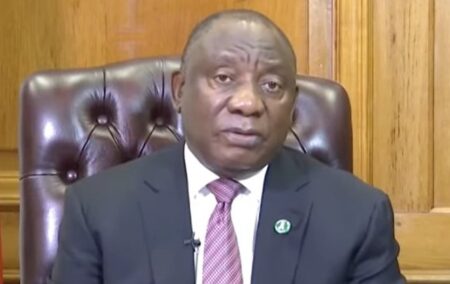South Africa will remain on Coronavirus Alert Level 1 ‘for now’, with no new restrictions, but talks are under way to ‘make vaccination a condition for access to workplaces, public events, public transport and public establishments’, according to President Cyril Ramaphosa.
Ramaphosa made the announcements in a national television address last night amid rising Covid infections and mounting world alarm over the emergence of the new Omicron variant.
The need for any adjustment in Covid measures would be assessed in a week.
He sharply criticised travel bans imposed by a host of countries in the past few days, saying South Africa was ‘deeply disappointed’ at measures that ‘are unjustified and unfairly discriminate against our country and our Southern African sister countries’.
‘The prohibition of travel is not informed by science, nor will it be effective in preventing the spread of this variant,’ he said.
Ramaphosa called on countries that had imposed bans ‘to urgently reverse their decisions and lift the ban they have imposed before any further damage is done to our economies and to the livelihoods of our people’.
South Africa had ‘seen an average of 1 600 new cases in the last seven days, compared to just 500 new daily cases in the previous week, and 275 new daily cases the week before that’. The proportion of positive tests had ‘risen from around 2 percent to 9 percent in less than a week’.
‘If cases continue to climb, we can expect to enter a fourth wave of infections within the next few weeks, if not sooner. This should not come as a surprise.’
Following a meeting of the National Coronavirus Command Council on Saturday, the President’s Coordinating Council and the Cabinet decided South Africa would remain on Alert Level 1 ‘for now’.
‘We will closely monitor infection rates and hospitalisation over the coming days and will review the situation in another week. We will then need to determine whether the existing measures are adequate or whether changes need to be made to the current regulations.’
Ramaphosa said: ‘In taking the decision not to impose further restrictions at this stage, we considered the fact that when we encountered previous waves of infection, vaccines were not widely available and far fewer people were vaccinated.’
Forty-one percent of adult South Africans had now received at least one vaccine dose, and 35.6 per cent were fully vaccinated against Covid-19.
However, while this was ‘welcome progress’, it was ‘not enough to enable us to reduce infections, prevent illness and death and restore our economy’.
In view of this, the government had been ‘undertaking engagements with social partners and other stakeholders on introducing measures that make vaccination a condition for access to workplaces, public events, public transport and public establishments’.
‘Government has set up a task team that will undertake broad consultations on making vaccination mandatory for specific activities and locations. The task team will report to the Inter-Ministerial Committee on Vaccination chaired by the Deputy President, which will make recommendations to Cabinet on a fair and sustainable approach to vaccine mandates.
‘We realise that the introduction of such measures is a difficult and complex issue, but if we do not address this seriously and as a matter of urgency, we will continue to be vulnerable to new variants and will continue to suffer new waves of infection.’
In the meantime, he encouraged South Africans to get vaccinated, and to continue wearing masks, and avoiding crowded – especially indoor – events.

